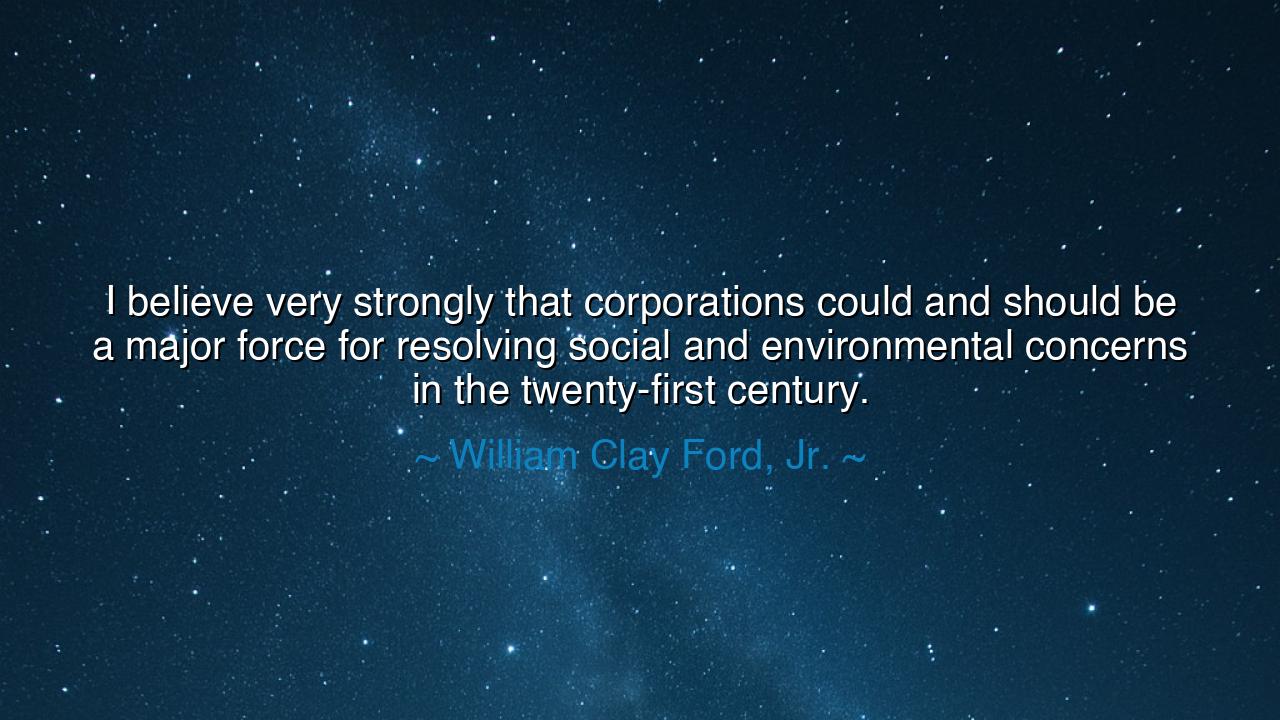
I believe very strongly that corporations could and should be a
I believe very strongly that corporations could and should be a major force for resolving social and environmental concerns in the twenty-first century.






Hear these words of William Clay Ford, Jr., heir of a lineage of builders and innovators: “I believe very strongly that corporations could and should be a major force for resolving social and environmental concerns in the twenty-first century.” This is not a whisper, nor a dream spoken idly. It is a summons to power, a recognition that in our age, vast corporations wield strength greater than kingdoms once did, commanding wealth, labor, and influence that touch every corner of the earth. The question is not whether they have power, but whether they will use it for the good of the people and the healing of the land.
In the times of old, it was kings who bore the burden of stewardship. They were judged not only by their conquests, but by the prosperity of their lands, the fertility of their soil, and the peace of their people. But in this new age, corporations have become the giants that shape destinies. They dig the mines, forge the metals, build the engines, and spread their works across nations. If they act only for profit, heedless of destruction, they will lead the earth into ruin. But if they embrace the mantle of guardianship, they could yet turn the tide of social and environmental decay.
Consider the tale of Patagonia, the company that pledged not only to sell clothing, but to safeguard nature. They gave their profits to environmental causes, repaired goods so that waste would not multiply, and called upon their customers to consume with conscience rather than greed. In this way, a corporation became a steward, showing that great powers need not destroy, but can instead nurture. This is the vision that Ford proclaims: that the vast engines of commerce, rather than driving us toward collapse, can be steered toward renewal.
Yet this vision does not come without peril. For history bears witness to many enterprises that ravaged the earth—companies that stripped forests bare, that poured poisons into rivers, that built empires on the backs of workers crushed by toil. To entrust corporations with the fate of society is to walk a narrow path, one that requires both vigilance and courage. For while they hold resources and reach, they must be bound by conscience, by law, and by the cry of the people, lest they betray their promise for gain.
Ford’s words carry both hope and responsibility. He does not say that governments alone must solve the crises of hunger, poverty, and climate. Nor does he declare that individuals, in their small actions, can bear the burden unaided. Instead, he names the great truth: that those with the greatest power—corporations—must shoulder the greatest share of action. Just as kings of old were measured by the welfare of their subjects, so now must corporations be measured not by profit alone, but by their legacy upon the earth and upon humanity.
The lesson for us is twofold: first, to demand that corporations act with integrity and vision, to hold them accountable as we once held rulers accountable for justice. Second, to remember that each choice we make—each purchase, each voice raised in advocacy—guides them. For corporations do not act in a vacuum; they respond to the will of the people, the laws of nations, and the cry of conscience. If we demand stewardship, they will learn stewardship. If we reward destruction, they will persist in destruction.
Therefore, let each listener take this teaching to heart: support enterprises that serve the common good, challenge those that despoil the land, and never forget that even the mightiest institutions can be swayed by the hands of many. Corporations possess the power of empires, but it is we, the people, who grant them their strength. If we bind them with duty, encourage them toward wisdom, and lift up those who lead with courage, then they shall indeed become a force for renewal in this century of trials.
So let us declare, in the spirit of William Clay Ford, Jr.: corporations could be the destroyers of our age, but they should be the saviors. And if they take up this sacred charge, guided by conscience and compelled by the people, then the twenty-first century may yet be remembered not as the age of collapse, but as the age of restoration.






AAdministratorAdministrator
Welcome, honored guests. Please leave a comment, we will respond soon